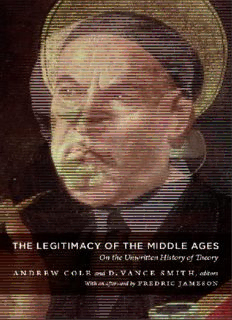
The Legitimacy of the Middle Ages: On the Unwritten History of Theory (Post-Contemporary Interventions) PDF
Preview The Legitimacy of the Middle Ages: On the Unwritten History of Theory (Post-Contemporary Interventions)
The Legitimacy of the Middle Ages post-contemporary interventions Series Editors: Stanley Fish and Fredric Jameson The Legitimacy of the Middle Ages On the Unwritten History of Theory andrew cole and d. vance smith, eds. Duke University Press durham & london 2010 ∫ 2010 Duke University Press All rights reserved Printed in the United States of America on acid-free paper $ Designed by Jennifer Hill Typeset in Arno Pro by Keystone Typesetting, Inc. Library of Congress Cataloging-in-Publication Data appear on the last printed page of this book. For Gruppe 190 Contents Acknowledgments ix Introduction Outside Modernity andrew cole and d. vance smith 1 theological modernities The Sense of an Epoch Periodization, Sovereignty, and the Limits of Secularization kathleen davis 39 The Sacrament of the Fetish, the Miracle of the Commodity Hegel and Marx andrew cole 70 Empire, Apocalypse, and the 9/11 Premodern bruce holsinger 94 Response More Than We Bargained For michael hardt 119 scholastic modernities We Have Never Been Schreber Paranoia, Medieval and Modern erin labbie and michael uebel 127 Medieval Studies, Historicity, and Heidegger’s Early Phenomenology ethan knapp 159 Medieval Currencies Nominalism and Art c. d. blanton 194 Response Medusa’s Gaze jed rasula 233 Afterword On the Medieval fredric jameson 243 Bibliography 247 Contributors 269 Index 271 viii Contents Acknowledgments The editors would like to thank Reynolds Smith at Duke University Press for his interest in this project and Ryan Perry for his work on the bibliogra- phy. We are also grateful for the time and attention two anonymous readers for Duke devoted to this volume, improving it with their criticism. A part of Kathleen Davis’s essay ‘‘The Sense of an Epoch’’ was pub- lished in her book Periodization and Sovereignty: How Ideas of Feudalism and Secularization Govern the Politics of Time (2007) and appears here, in a different form, by permission of the University of Pennsylvania Press. Bruce Holsinger’s essay ‘‘Empire, Apocalypse, and the 9/11 Premodern’’ first appeared in Critical Inquiry 34, no. 3, ∫2008 by the University of Chicago Press. All rights reserved. The author modified this essay for the present volume. We thank these publishers for permission to adapt these essays here.
Description: